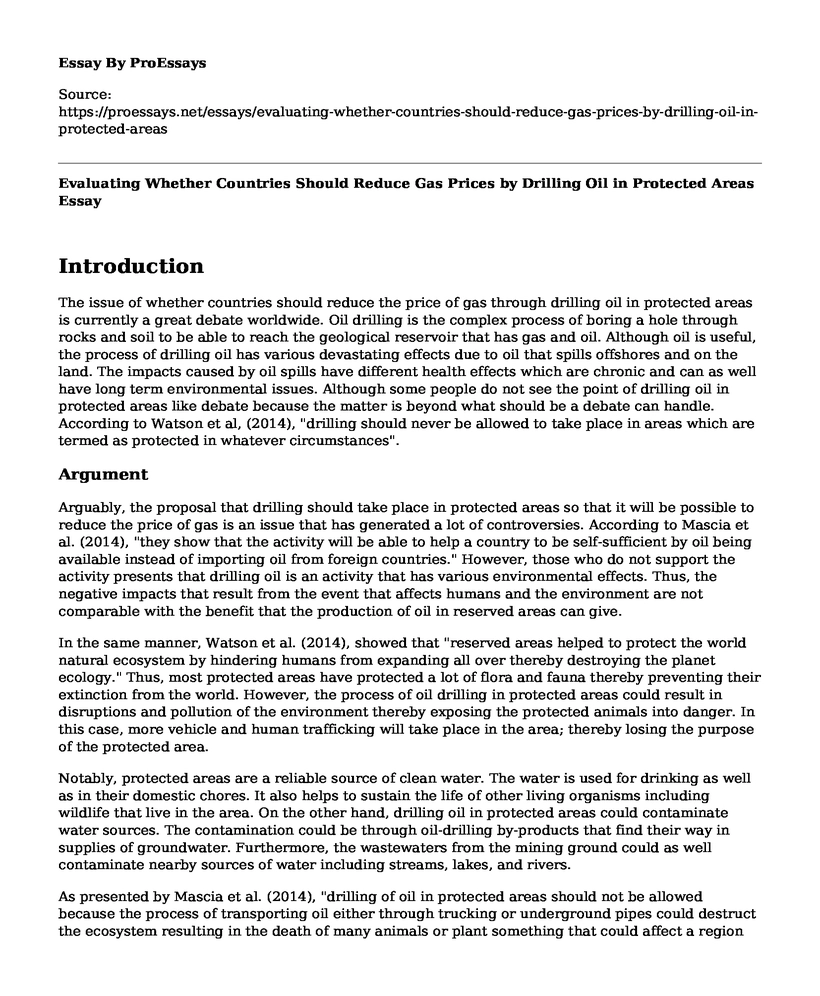Introduction
The issue of whether countries should reduce the price of gas through drilling oil in protected areas is currently a great debate worldwide. Oil drilling is the complex process of boring a hole through rocks and soil to be able to reach the geological reservoir that has gas and oil. Although oil is useful, the process of drilling oil has various devastating effects due to oil that spills offshores and on the land. The impacts caused by oil spills have different health effects which are chronic and can as well have long term environmental issues. Although some people do not see the point of drilling oil in protected areas like debate because the matter is beyond what should be a debate can handle. According to Watson et al, (2014), "drilling should never be allowed to take place in areas which are termed as protected in whatever circumstances".
Argument
Arguably, the proposal that drilling should take place in protected areas so that it will be possible to reduce the price of gas is an issue that has generated a lot of controversies. According to Mascia et al. (2014), "they show that the activity will be able to help a country to be self-sufficient by oil being available instead of importing oil from foreign countries." However, those who do not support the activity presents that drilling oil is an activity that has various environmental effects. Thus, the negative impacts that result from the event that affects humans and the environment are not comparable with the benefit that the production of oil in reserved areas can give.
In the same manner, Watson et al. (2014), showed that "reserved areas helped to protect the world natural ecosystem by hindering humans from expanding all over thereby destroying the planet ecology." Thus, most protected areas have protected a lot of flora and fauna thereby preventing their extinction from the world. However, the process of oil drilling in protected areas could result in disruptions and pollution of the environment thereby exposing the protected animals into danger. In this case, more vehicle and human trafficking will take place in the area; thereby losing the purpose of the protected area.
Notably, protected areas are a reliable source of clean water. The water is used for drinking as well as in their domestic chores. It also helps to sustain the life of other living organisms including wildlife that live in the area. On the other hand, drilling oil in protected areas could contaminate water sources. The contamination could be through oil-drilling by-products that find their way in supplies of groundwater. Furthermore, the wastewaters from the mining ground could as well contaminate nearby sources of water including streams, lakes, and rivers.
As presented by Mascia et al. (2014), "drilling of oil in protected areas should not be allowed because the process of transporting oil either through trucking or underground pipes could destruct the ecosystem resulting in the death of many animals or plant something that could affect a region natural balance." Additionally, Macey et al. (2014) presented that, "oil spills tend to occur in most cases during the drilling process and can wipe the ecosystem and wildlife while their effects can be felt for many years afterward".
Conclusion
In conclusion, it is clear that drilling of oil in protected areas should not be allowed in an attempt to reduce the price of oil and gas in a country. Nevertheless, if the activity was carried out, then it could have been a way of destroying the protected areas, and this would result in the loss of valuable natural resources. Hence, drilling of oil in the protected area is an activity which will never be allowed to take place in any nation since it is more of a loss rather than again.
Works cited
Macey, Gregg P., et al. "Air concentrations of volatile compounds near oil and gas production: a community-based exploratory study." Environmental Health 13.1 (2014): 82.
Mascia, Michael B., et al. "Protected area downgrading, downsizing, and degazettement (PADDD) in Africa, Asia, and Latin America and the Caribbean, 1900-2010." Biological Conservation 169 (2014): 355-361.
Watson, James EM, et al. "The performance and potential of protected areas." Nature 515.7525 (2014): 67.
Cite this page
Evaluating Whether Countries Should Reduce Gas Prices by Drilling Oil in Protected Areas. (2022, Nov 09). Retrieved from https://proessays.net/essays/evaluating-whether-countries-should-reduce-gas-prices-by-drilling-oil-in-protected-areas
If you are the original author of this essay and no longer wish to have it published on the ProEssays website, please click below to request its removal:
- Renewable Resources vs. Non-Renewable Resources Essay
- Earthquake in Nepal and Its Aftermath Essay
- Essay Example on Winter Survival: Nature's Mysteries, Animal Adaptations
- Essay Example on Business Activities: Impact on Living Standards and Minimizing Unemployment
- Mgmt Morally Liable for Employees' Deaths: Poor Working Conditions - Essay Sample
- Optimizing Resources at Afton Regional Hospital (ARH) - Essay Sample
- Essay Sample on Drinking Reused Water: Boosting Natural Processes with Technology







